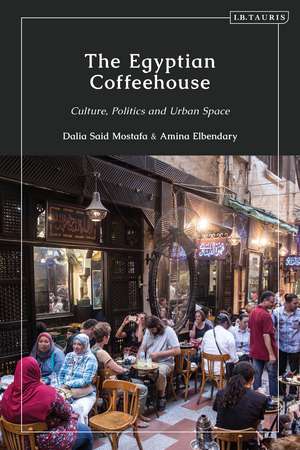The Egyptian Coffeehouse: Culture, Politics and Urban Space
Autor Dalia Mostafa, Amina Elbendaryen Limba Engleză Hardback – 25 noi 2020
| Toate formatele și edițiile | Preț | Express |
|---|---|---|
| Paperback (1) | 196.44 lei 6-8 săpt. | |
| Bloomsbury Publishing – 18 mai 2022 | 196.44 lei 6-8 săpt. | |
| Hardback (1) | 597.26 lei 6-8 săpt. | |
| Bloomsbury Publishing – 25 noi 2020 | 597.26 lei 6-8 săpt. |
Preț: 597.26 lei
Preț vechi: 857.87 lei
-30% Nou
Puncte Express: 896
Preț estimativ în valută:
114.36€ • 117.97$ • 94.78£
114.36€ • 117.97$ • 94.78£
Carte tipărită la comandă
Livrare economică 20 februarie-06 martie
Preluare comenzi: 021 569.72.76
Specificații
ISBN-13: 9780755635245
ISBN-10: 0755635248
Pagini: 192
Ilustrații: 6 bw & 5 colour illus
Dimensiuni: 156 x 234 x 22 mm
Greutate: 0.46 kg
Editura: Bloomsbury Publishing
Colecția I.B.Tauris
Locul publicării:London, United Kingdom
ISBN-10: 0755635248
Pagini: 192
Ilustrații: 6 bw & 5 colour illus
Dimensiuni: 156 x 234 x 22 mm
Greutate: 0.46 kg
Editura: Bloomsbury Publishing
Colecția I.B.Tauris
Locul publicării:London, United Kingdom
Caracteristici
1. The first volume in English to analyse the historical roots of the popular coffeehouse, a feature of culture and society in Egypt
Notă biografică
Dalia Said Mostafa is Lecturer in Arabic and Comparative Literature in the Arabic and Middle Eastern Studies Department, the University of Manchester, UK. She also teaches contemporary cinema of the Middle East and North Africa. She has published extensively on Arabic and comparative literature, Middle Eastern cinema, and popular culture in Egypt.She is the author of The Egyptian Military in Popular Culture: Context and Critique (2017), and the editor of Women, Culture, and the January 2011 Egyptian Revolution (2017).Amina Elbendary is Associate Professor of History at the Department of Arab and Islamic Civilizations, the American University in Cairo, Egypt. Her research interests include Arabic historiography, Mamluk social and cultural history, and Islamic political thought. She is the author of Crowds and Sultans: Urban Protest in Late Medieval Egypt and Syria (2015).
Recenzii
This original and much needed study establishes the cultural importance of the Egyptian coffeehouse both in terms of its social history and in terms of its iconic representation in literature, film and musical performance. In exploring the coffeehouse as a hub of friendships, creativity and activism the study wonderfully illuminates how coffeehouse dynamics are continuous with Egypt's periodic revolutions.
This book is a brilliant example of cultural studies where the site of the coffeehouse is selected to throw light on its role and development in Egyptian society. Using cultural history, urban sociology, literary criticism, interviews, photos, and film scenes related to Egyptian cafés demonstrates a successful interdisciplinary approach and contributes to reading the coffeehouse as a metonym of an evolving society. The book is both informative and entertaining, accessible to the general reader and thought-provoking to the specialist.
This book is a brilliant example of cultural studies where the site of the coffeehouse is selected to throw light on its role and development in Egyptian society. Using cultural history, urban sociology, literary criticism, interviews, photos, and film scenes related to Egyptian cafés demonstrates a successful interdisciplinary approach and contributes to reading the coffeehouse as a metonym of an evolving society. The book is both informative and entertaining, accessible to the general reader and thought-provoking to the specialist.
